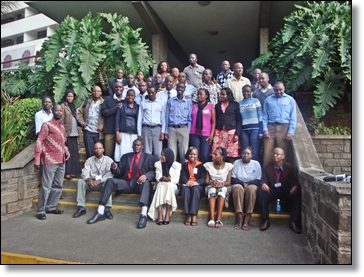EAC: Unveiling Opportunities for Youth

 |
|
East African youth pose for a photo after the IREN Think Tank Forum for Youth on the East African Community |
Notwithstanding the general benefits of such a block, let’s examine how the youth can take advantage of such a grouping.
Fundamentally, the opportunity for education advancement on a broader scale avails youth the opportunity to acquire knowledge across borders. The first step to empowerment is knowledge. An educated youthful population is vital to the growth of a nation as it avails a nation a pool of competent human capital that can positively contribute to the growth of the nation. The regional block only removes the physical borders however the information age has already created a borderless society. Youth have the opportunity to augment the knowledge bank moving away from traditional channels. What we should see in the coming years is an increase in online knowledge banks, discussion boards, blogs and think tanks. This consequently presents youth with a platform to contribute to national and regional challenges. It is important to note that often the youth feel ignored and uninvolved. They must however earn the right to be heard. We therefore must be seen to bring something to the table. The opportunity to cross borders a lot more freely means that youth can access better education services from any of the regions countries.
Vital to the youth is the opportunity to form beneficial cross-border networks for both social and economic benefits. What this means is that businesses can have a regional presence as a result of networks in each of the countries. For example, a business originated in Rwanda can expand into Uganda through a connection in Uganda without movement of staff from Rwanda. This can particularly be achieved in the professional services industry like law firms, audit and accountancy firms as well as other consultancies.
The growth of the region will be driven by the technologically savvy youth. By combining knowledge and technology, youth have the opportunity of breeding local content, African e-products. Most of the popular online tools popularly enjoyed have been developed outside Africa. Youth in the region have the opportunity to influence the information age of their day.Youth bring new alternative thinking to national and regional politics particularly driven by greater and deeper networks. It is vital to note that the tribal divide that has existed in a country like Uganda has been largely broken by youth who have comfortably integrated and therefore transcended the tribal divide. Youth are therefore vital in enforcing regional unity which is essential for the block to achieve its goals.
Youth by nature are dynamic go-getters and are therefore a challenge to present day bureaucratic processes that curtail many government operations. Youth have the opportunity to challenge the thinking of the day and remain a vital resource to nation building, bringing fresh novel ideas to the table with the potential to transform the region’s economies in resonance with the 21st century global village.
By Edgar Rutaagi
Trade Finance
Standard Chartered Bank (U) Ltd
